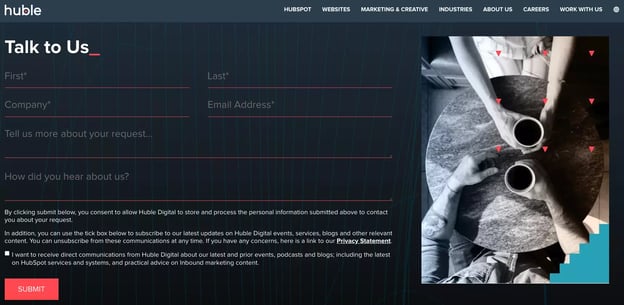In this article, we will delve deeper into dark funnel marketing, its strategies, and how it can enhance the customer journey. We also look at the challenges companies face in tracking dark funnel activities and the importance of effective tracking and attribution methods.
Marketing has become increasingly complex, and traditional marketing channels no longer provide a complete picture of customer interactions.
This is where dark funnel marketing comes into play.
Dark funnel marketing refers to the hidden or undisclosed sources of website traffic and conversions. It represents the marketing activities that are not easily traceable or attributed to specific marketing channels.
Unlike traditional marketing channels such as direct traffic or social media referrals, dark funnel activities occur when potential customers interact with a brand without leaving a clear trace of their origin.
With its focus on understanding and leveraging hidden customer interactions, dark funnel marketing has the potential to enhance the customer journey by uncovering valuable insights, optimising touchpoints, and delivering personalised experiences that resonate with potential customers.
Understanding dark funnel marketing
Several factors have contributed to the rise of dark funnel activities in digital marketing.
Privacy awareness has increased, causing people to be more cautious about sharing personal information online. This, in turn, has reduced the availability of tracking cookies and other mechanisms, making it harder to track customers' digital footprints.
Additionally, customers now engage with brands through multiple channels, both online and offline, making it challenging to attribute conversions accurately.
Social and third-party platforms, such as social media, review sites, and online communities, have become popular channels for customer interactions, acting as dark funnel channels where potential customers engage without leaving a clear trace.
Dark funnel marketing introduces a range of channels beyond traditional trackable sources, influencing customer behaviour and presenting unique challenges for marketers.
These include dark social, where sharing occurs through private messaging apps or email, making it difficult to track the content's source.
Organic search is another common dark funnel channel, as customers may conduct generic searches, visit websites without enabling cookies, and convert later through a different channel.
Additionally, potential customers often turn to third-party websites and review platforms to gather information and opinions, making attribution challenging.
Understanding these channels enables the development of effective strategies to engage potential customers and guide them through the customer journey.
The customer journey and dark funnel marketing
The customer journey has transformed due to abundant information, the proliferation of digital touchpoints, and changing consumer behaviours.
It encompasses multiple stages, from initial awareness to purchase decision, providing opportunities for companies to engage and influence potential customers.
However, optimising the customer journey faces a significant challenge: tracking and attributing dark funnel activities.
Dark funnel marketing introduces ambiguity by involving interactions that are challenging to link to specific marketing efforts. This lack of visibility hinders marketers from understanding campaign effectiveness and resource allocation.
Dark funnel activities like dark social sharing, untraceable organic search, and engagements on third-party websites complicate accurate conversion attribution and impact measurement.
This attribution gap creates a blind spot, impeding companies from comprehending the touchpoints shaping customer decision-making.
Understanding dark funnel marketing is crucial for companies striving to optimise the customer journey and foster meaningful engagement. Insights into dark funnel activities reveal hidden touchpoints, influential channels, and enable tailored marketing strategies.
Effective tracking and attribution of dark funnel activities provide valuable data and insights, empowering informed marketing decisions.
By closing the attribution gap, companies gain a holistic view of the customer journey, identify areas for improvement, and implement targeted strategies for an enhanced customer experience.
Moreover, understanding dark funnel marketing enables companies to engage potential customers timely, with relevant messages through appropriate channels.
This personalised approach enriches the customer journey, delivering pertinent information, building trust, and guiding confident purchasing decisions.
Enhancing the customer journey with dark funnel marketing
Enhancing the customer journey with dark funnel marketing requires strategic approaches to leverage its potential. Here are a few key strategies for effectively leveraging dark funnel marketing:
Gather customer feedback
As noted above, tracking and attributing dark funnel activities in marketing poses unique challenges compared to traditional approaches.
To address these challenges, gathering customer feedback and insights becomes crucial. Actively seeking feedback through surveys, interviews, and reviews helps identify touchpoints and understand decision-making processes within dark funnel channels.
Another strategy is self-attribution, where companies prompt customers to share where they found the brand or what influenced their decision. While this method may not capture the complete picture, it provides valuable insights directly from customers.

An example of this is as simple as adding a “How did you hear about us?” field to your forms.
Encourage direct engagement with potential customers
Rather than relying solely on trackable sources like website analytics, companies can actively seek opportunities to interact with potential customers through direct channels.
One effective way to encourage direct engagement is through social media channels. Platforms like Facebook, Twitter, and Instagram provide a space for companies to engage with their audience by responding to comments, addressing inquiries, and sharing relevant content.
For example, a restaurant can leverage social media to engage with potential customers by sharing mouth-watering food photos, responding to comments and messages, and even running polls to gather feedback on menu preferences.
Online communities and forums related to the industry or niche are also valuable platforms for direct engagement. By actively participating in discussions, offering insights, and providing solutions to customers' challenges, companies can establish themselves as trusted authorities and gain valuable feedback.
For instance, a software company can engage with potential customers on a tech forum by sharing helpful tips and addressing their questions about software functionalities.
By doing so, companies can gather valuable insights into customer interests, preferences, and pain points. This information can then be used to tailor marketing strategies, create personalised content, and develop products or services that better meet customer needs.
Leverage social listening tools and analytics platforms
Social listening tools and analytics platforms play a crucial role in unlocking the power of dark funnel marketing.
Social listening tools enable companies to monitor and analyse conversations, mentions, and trends related to their brand, industry, or products across various social media channels. This allows companies to identify and understand customer sentiments, preferences, and emerging trends.
By using social listening tools, companies can uncover hidden dark funnel activities. For example, they can identify instances of dark social sharing, where customers privately share content through messaging apps or email, without leaving a traceable source.
These insights provide companies with a deeper understanding of customer behaviours and the impact of these activities on their marketing strategies.
Analytics platforms complement social listening tools by providing valuable data and insights into customer behaviours, preferences, and patterns.
These platforms can track and analyse customer interactions, engagement levels, and conversion rates. By leveraging these insights, companies can identify key touch points along the customer journey, measure the effectiveness of their marketing efforts, and optimise their strategies for better results.
Integrating marketing automation and CRM systems further enhances tracking capabilities by monitoring customer interactions across multiple channels. This integration provides better visibility into the customer journey, facilitating attribution of conversions to the appropriate touchpoints.
For example, an eCommerce retailer using analytics platforms may discover that a significant portion of their conversions comes from customers who initially visited their website through organic search but made a purchase through a different channel later.
This insight allows the retailer to optimise their marketing strategy by placing greater emphasis on organic SEO and implementing remarketing campaigns to re-engage potential customers who have shown interest.
Utilise gated content and third-party content platforms
Gated content serves as an effective strategy to capture valuable customer information while providing valuable resources to potential customers.
By offering ebooks, whitepapers, or exclusive resources behind a registration form or paywall, businesses can collect customer data such as names, email addresses, and demographic information. This enables companies to track and attribute conversions to specific marketing efforts, gaining insights into the effectiveness of their campaigns.
For example, a software company may offer a free ebook on cybersecurity best practices. Interested users would need to provide their contact information, including their email address, to access the ebook.
With this information, the software company can track the number of downloads, measure the conversion rate, and follow up with targeted email marketing campaigns.
In addition to gated content, partnering with relevant third-party content platforms can significantly enhance a company’s dark funnel marketing strategy.
By collaborating with established platforms, companies can tap into their existing audiences and expand their reach to potential customers who may not have directly interacted with their brand.
For instance, a fashion brand could partner with a popular fashion blog to contribute guest articles or collaborate on a sponsored post. This collaboration allows the fashion brand to expose its products and brand to a wider audience, leveraging the established credibility and reach of the blog's readership.
These strategies not only enable companies to track and attribute conversions but also provide valuable content and expand their brand visibility to potential customers who are actively engaging with relevant platforms and resources.
Focus on personalised and relevant content
In the realm of dark funnel marketing, where direct tracking is limited, the delivery of personalised and relevant content becomes paramount.
By gaining a deep understanding of customer preferences, pain points, and buying behaviours, companies can craft tailored content that resonates with potential customers, ultimately building trust and driving engagement.
For example, an online fitness retailer may analyse customer data and discover that a significant portion of their target audience consists of individuals interested in weight loss.
Armed with this knowledge, the retailer can create a series of personalised emails or blog articles that provide valuable tips, workout routines, and nutrition advice specifically geared towards weight loss.
By addressing the specific needs and interests of their audience, the retailer can establish themselves as a trusted authority in the weight loss space and drive higher levels of engagement and conversions.
Moreover, companies can leverage customer data and behavioural insights to create personalised recommendations or product suggestions.
By analysing previous purchases, browsing history, and demographic information, companies can offer targeted recommendations that align with the customer's preferences and needs. This level of personalisation enhances the customer experience, increases the chances of conversion, and fosters long-term customer loyalty.
By delivering personalised and relevant content, companies can effectively navigate the dark funnel landscape and make meaningful connections with potential customers.
By tailoring their messaging and content to align with customer preferences and needs, companies can establish trust, foster engagement, and ultimately guide potential customers through the customer journey with a higher likelihood of conversion.
Leverage intent signals and buyer behaviours for targeted marketing efforts
Dark funnel activities present a treasure trove of valuable intent signals and insights into buyer behaviours. By carefully analysing these signals, companies can identify potential customers who are actively researching and considering their products or services.
This information can then be harnessed to deploy targeted marketing campaigns, personalised messaging, and compelling offers that align perfectly with the customers' needs and interests.
For instance, let's consider an eCommerce fashion retailer. By monitoring dark funnel activities such as specific product searches, engagement with fashion influencers, or interactions on fashion-focused online communities, the retailer can gather intent signals indicating that certain individuals are in the market for new clothing items.
Knowing this, the retailer can create personalised email campaigns or social media ads showcasing relevant clothing options, exclusive discounts, or curated style recommendations tailored to the customer's preferences.
This targeted approach increases the likelihood of capturing their attention, fostering engagement, and ultimately driving conversions.
Understanding and leveraging intent signals and buyer behaviours from dark funnel activities allows companies to go beyond traditional mass marketing approaches.
Instead, they can deliver highly targeted and relevant content, offers, and experiences that directly address the customer's needs and desires. This personalised approach enhances the customer journey, increases conversion rates, and cultivates long-term customer loyalty.
Effective implementation of these strategies enables companies to enhance the customer journey by creating meaningful interactions, capturing valuable data, and delivering personalised experiences.
Dark funnel marketing provides an opportunity to connect with potential customers beyond traditional trackable sources, ultimately driving conversions and fostering long-term customer relationships.
How Huble can help optimise your dark funnel marketing
Optimising your dark funnel marketing strategy is crucial to enhancing the customer journey and driving meaningful results. Understanding the complexities of dark funnel activities and effectively leveraging them requires expertise and strategic guidance.
If you’re looking to optimise your dark funnel marketing efforts, Huble’s marketing consultancy services can help. Our experienced team of consultants understands the challenges companies face in tracking and attributing customer interactions, and we have the knowledge and tools to overcome these obstacles.
By partnering with us, you gain access to a range of services and strategies designed to optimise your dark funnel marketing.
We can assist you in implementing key strategies such as encouraging direct engagement with potential customers, integrating analytics tools with CRM systems, utilising gated content and third-party content platforms, and delivering personalised and relevant content to drive customer engagement.
To learn more about how Huble can help your company optimise its dark funnel marketing strategy, speak with our team.








.png)





